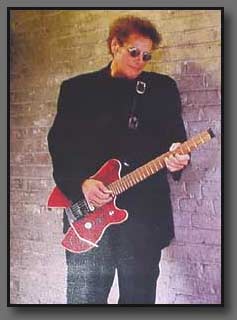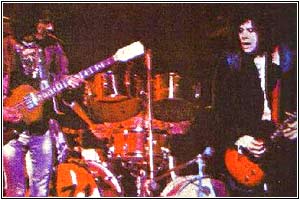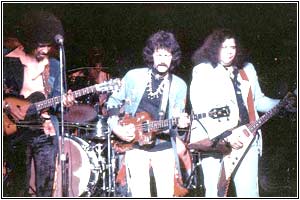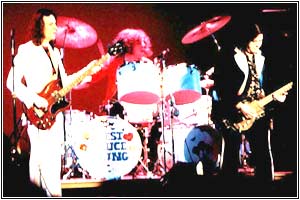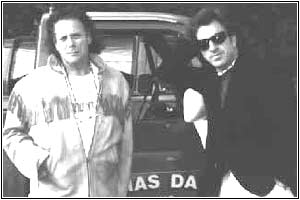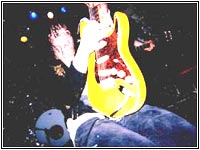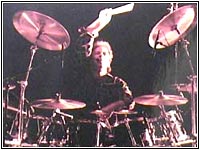| LESLIE WEST BIOGRAPHY |
They were one of the most appropriately named groups of their time. For although Mountain has been through numerous personnel changes over the years, always at the epicenter of this hard-rockin', raucous blues-rock group was that giant of a man, both physically and musically, Leslie West. Born and raised in Forest Hills, New York, West dropped out of the 10th grade to concentrate exclusively on his guitar playing. By the time he was in his early teens, he knew he wanted to dedicate his life to the instrument. It's what he has done ever since. West has always served as the driving force behind Mountain, calling his fellow Mountain-mate Corky Laing out of rock 'n' roll semi-retirement several times over the years for brief road trips. Today, West continues to perform, blowing away audiences in the U.S., Canada, England and the rest of Europe with his potent, carefully crafted blend of decibels and vibrato. Since the 1974 breakup of the legendary group that also originally included producer/ bassist Felix Pappalardi West has worked at various times in the ensuing years as a guitar teacher and guitar designer, as well as a solo performer. But it is his work with Mountain, primarily in the late '60s and '70s, that has given him his reputation as a rock giant. West was born Leslie Weinstein on October 22,1945 in Forest Hills, while drummer Laing, whom West describes as "my best friend," was born in Montreal, Canada on January 26, 1948. The two met at a beach club in Long Island, as Laing explains here, when West was 19 and Laing was 16. Born into a show business family, West's uncle, Will Glickman, was a writer for television's Jackie Gleason Show. One day West's grandmother took him to a taping of the show, but it was canceled. Instead, West ended up in the studio audience for Elvis Presley's first appearance on television on The Stage Show. It was West's first exposure, to the guitar. "I've been playing guitar ever since that day," West recalled in a 1986 interview. His first band, The Vagrants, was a fairly unsophisticated bunch at first, West admits here. Popular in the New York area, particularly on Long Island, they were a major proponent of what has become known as the Long Island Sound, a soulful approach emphasizing R&B cover tunes and heavy use of the organ. Through a fortuitous gig at a long-closed club called the Rolling Stone, on Second Avenue in lower Manhattan, West and his bandmates began to get their chops together. The group recorded a single for Vanguard Records and several for Atco before hooking up with producer Felix Pappalardi. The Vagrants released a number of singles without much success before West teamed up with Pappalardi in early 1969 to form Mountain. After producing and playing on West's 1969 solo album, Leslie West - Mountain, the group called Mountain (which included Pappalardi, drummer N.D. Smart and keyboardist Steve Knight), made its debut at the Fillmore West in July 1969. Mountain quickly created a buzz among San Francisco rock 'n' roll aficionados hungering for something new and different since the breakup of Cream. Their fourth gig the group's first on the East Coast, was at a little gathering called Woodstock.
Mountain's first album, Mountain Climbing, was released in early 1970, to widespread praise by critics. Corky Laing, who had been working with the band as a roadie of sorts replaced original drummer Smart in the band and recorded the album. That summer, Mountain's debut moved into the Top 10 and went gold by August. The group's first single, "Mississippi Queen," rode the charts for four months in 1970, though it never rose above #21. Mountain's second album, Nantucket Sleighride, went gold by May 1971, having been released just a few months earlier. The group garnered other chart success and radio airplay with "Nantucket Sleighride," "For Yasgur's Farm,": and "The Animal Trainer And The Toad." Because of Mountain's relatively impressive debuts at the Fillmore West and Woodstock, the group quickly became a favorite on the then-emerging rock festival circuit. A live version of "Stormy Monday," (check out a new version) recorded at the Atlanta Pop Festival in 1971, was hailed by some critics as some of the best improvisation ever recorded by a rock group, anywhere.
The band quickly followed up 1971's Nantucket Sleighride with a second album that same year, Flowers Of Evil, noted for its exciting live version of "Mississippi Queen." The group released a live album, Mountain Live, in 1972, before splitting up. West and Laing teamed up with former Cream bassist Jack Bruce to record Why Dontcha and Whatever Turns You On in 1972 and 1973 before Bruce left the group in the summer of 1973. A live album, Live And Kickin', was released shortly after the trio's break-up, in 1974
Laing and West continued to work together in Leslie West's Wild West Show before hooking up again with Pappalardi and rhythm guitarist David Perry in the winter of 1974. The reformed Mountain (minus keyboards) recorded one album, 1974's Avalanche, before breaking up again later that year. Still working with Laing, West recorded two solo albums, The Great Fatsby (RCA) and The Leslie West Band (Phantom), both in 1975. After taking a break from recording through much of the 1980s, West recorded Theme in 1988 for Passport/Jem Records, and Alligator in 1989 for the same label, before hooking up with Blues Bureau International in 1993 for Leslie West Live and Dodgin' The Dirt. The latter, also released in 1993, includes West's interpretation of Billy Joel's "New York State Of Mind," complete with extended guitar solos. For the rest of 1993 and most of 1994, West worked with executives at Sony Music to put together the package that makes up the two compact disc Mountain anthology, Over The Top. Drummer Laing has played on every recording with the group except its debut, Mountain Climbing, and a live recording made in Japan, Twin Peaks.
West and Laing remain good friends, and one gets the sense from talking to both of them, that were Pappalardi still alive, they'd be touring this year as a trio. What was true in 1969, when Mountain formed, is still true today: no one plays loud, raucous blues-rock quite like Mountain -- Leslie West and Corky Laing and Felix Pappalardi IN THE BEGINNING and Leslie West, Ritchie Scarlett, and Steve Luongo currently.
While it may be frightening to some people to fathom that West will turn 56 in October, the ever-resourceful guitarist, song-writer, arranger, producer and teacher is always coming up with new licks and riffs and finding new equipment to play them through. Perhaps his resourcefulness and persistence stems from his tough New York City upbringing. But whatever the reason, it's easy enough to envision West making good use of his unique vibrato and his own style of loud raucous blues when he's in his 60s. |
